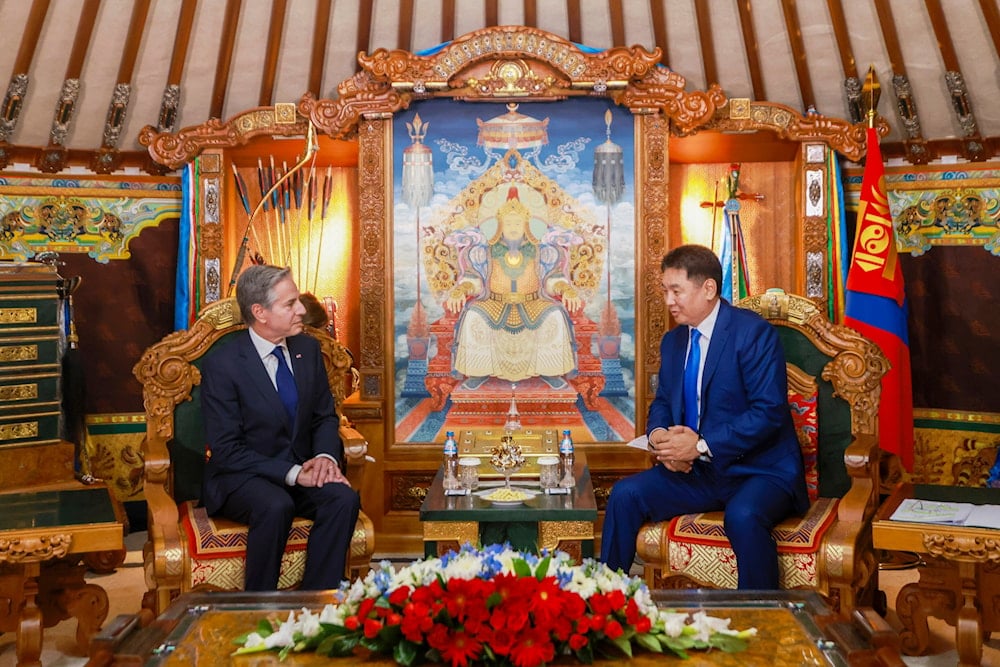Blinken hails expanding US-Mongolian ties at end of Asia tour
US Secretary of State Antony Blinken underlines that Mongolia is a central partner in the region as he hails their growing ties.
-

US Secretary of State Antony Blinken meets with Mongolian President Ukhnaagiin Khurelsukh in Ulaanbaatar on Thursday, August 1, 2024. (AP)
US Secretary of State Antony Blinken concluded his 10-day tour of Asia in Mongolia on Thursday, emphasizing the strengthening relations with the landlocked East Asian country.
During his extensive tour, which included visits to Southeast Asia and Japan, Blinken aimed to reinforce US support for its allies and counter China's "growing influence" in its own region. Despite this, Washington has claimed that it was not pursuing a policy of containment against Beijing.
In a meeting with Chinese counterpart Wang Yi in Vientiane, Laos, last week, Blinken engaged in what Washington described as "frank and productive" discussions.
In Japan and the Philippines, Blinken, along with US Defense Secretary Lloyd Austin, announced enhanced military and defense cooperation with these countries, addressing concerns over Beijing's alleged "provocations," particularly in the South China Sea.
US approach 'not targeted against any country'
While in Ulaanbaatar, Blinken alleged that the US approach is not targeted at any single country, as his administration sanctions nations such as Russia and Iran and implements sanctions aimed at curbing China's exports.
"It's for a common vision that we share for what the future should look like," Blinken stated during a press conference. "And yes, part of that common vision is clearly the freedom... for any country to make its own decisions, to make its own choices about the future."
The United States has expressed its intention to foster closer ties, including "people-to-people" exchanges, and to maintain a "comprehensive strategic dialogue" with Mongolia.
On Thursday, Blinken held talks with Mongolian Foreign Minister Batmunkh Battsetseg, who visited Washington last week to initiate the strategic dialogue. Blinken also met with President Ukhnaagiin Khurelsukh and Prime Minister Luvsannamsrain Oyun-Erdene, whose ruling party experienced a reduction in its majority in June's election.
"Mongolia is a central partner in this region," Blinken said, standing alongside his counterpart. "The United States and Mongolia are proud third neighbors, linked by shared democratic values, linked by common interests."
Washington aims to bolster its influence in Mongolia, a country with historical ties to Russia and significant trade relations with China. Blinken's visit underscores the importance of this relationship in the broader context of US foreign policy in Asia as the US itself seeks to expand its influence as it accuses Beijing of doing so.
US after minerals
The US is also in pursuit of the minerals in which Mongolia is abundant.
On August 2, US Vice President Harris and Mongolian Prime Minister Luvsannamsrain Oyun-Erdene met in the latest of a series of US engagements with the country, with discussions including vital minerals and China.
The United States is scouring the globe for crucial minerals required to construct electric vehicle batteries, powerlines, undersea cables, and other critical aspects of the energy transition. On that note, Mongolia's mining industry is thriving, accounting for over a quarter of the country's GDP.
“Most of its exports go to China at the moment and the U.S. … would like to get some of those resources for itself,” said Noah Gordon, a fellow at the Carnegie Endowment for International Peace.
“You can’t have an energy transition without critical minerals.”
State Department officials traveled to Mongolia in late June to meet with officials and private sector representatives, and signed a memorandum of understanding on critical mineral supply chains in the Pacific.

 4 Min Read
4 Min Read








